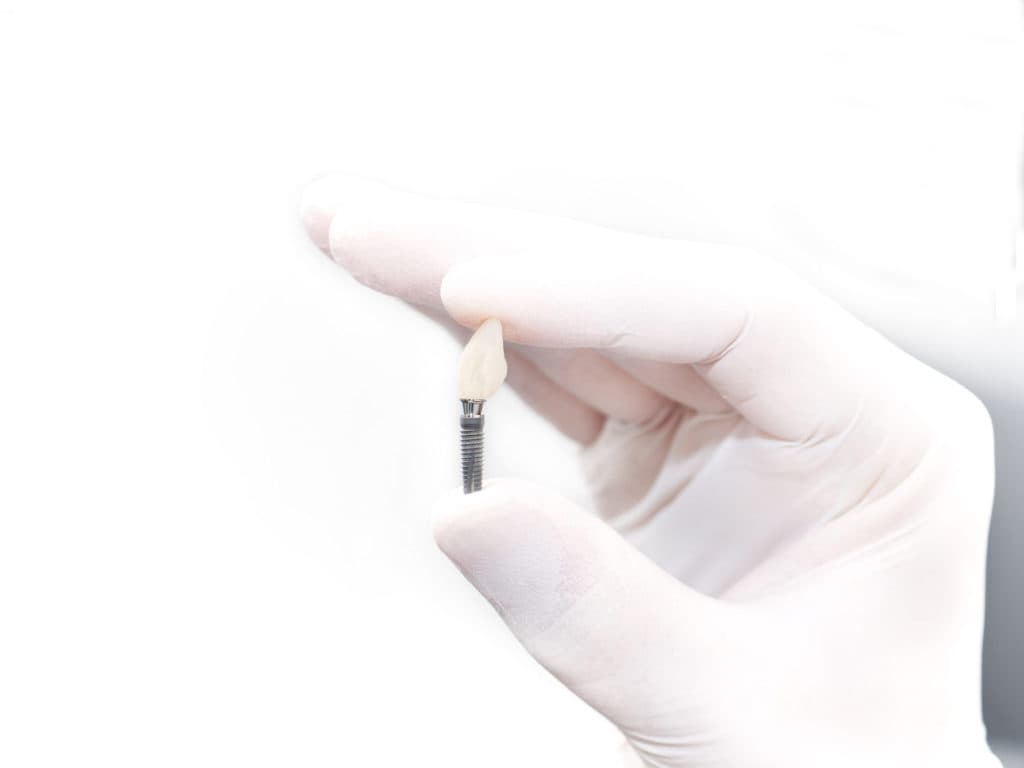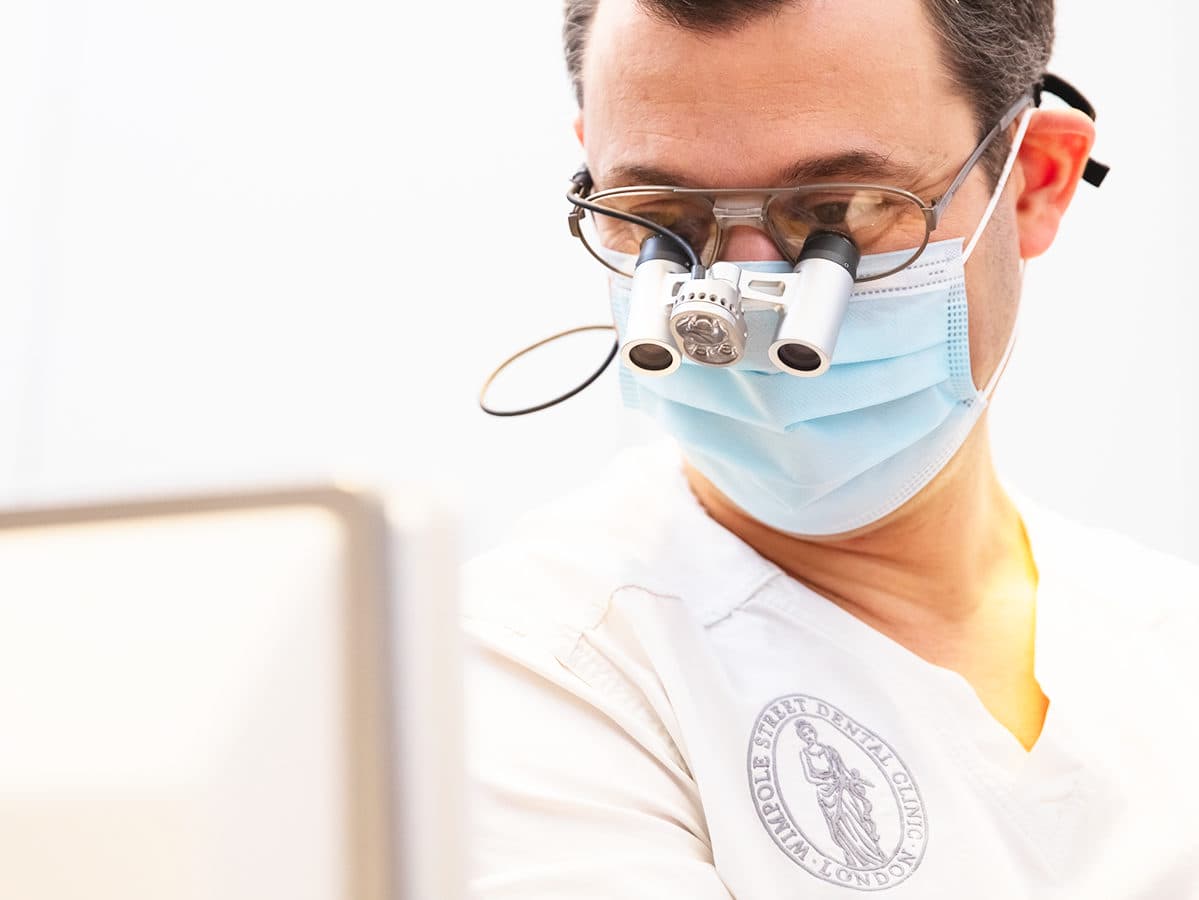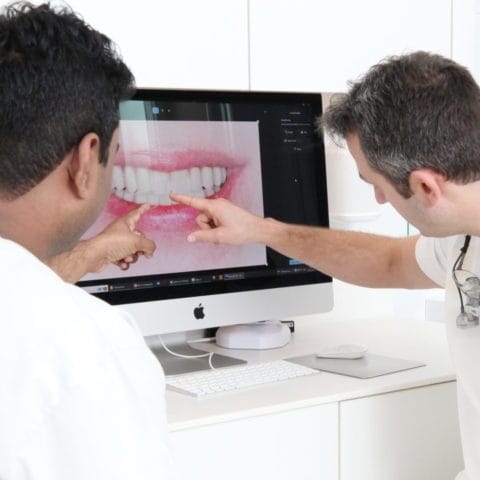Dental Implants in London
Implants are simply titanium screws replacing the former roots of a tooth. They are precisely placed into the jawbone socket under sterile conditions and using local anaesthesia in surgical treatment. Once the implant has healed into the bone, a full ceramic final restoration is placed. They are produced using our state-of-the-art technology to deliver a perfect match to the look and feel of your natural teeth.

Treatment Duration
30 mins – 5 hours

Price
From £2000/implant

Recovery Time
1 – 14 days

At Wimpole Street Dental Clinic, we understand the transformative impact dental implants can have on our patients’ lives. As a leading provider of dental implant services in London, we offer cutting-edge solutions for those seeking to replace missing teeth with an option that closely mimics natural teeth in both appearance and functionality.
Dental implants, small titanium posts surgically placed into the jawbone, act as artificial roots to support prosthetic teeth. This innovative approach not only restores the functionality and aesthetics of your smile but also promotes jawbone health, preventing the bone loss commonly associated with missing teeth. Our dental implants are a preferred alternative to traditional bridges or dentures due to their stability, comfort, and natural appearance.
The popularity of dental implants is evident in the UK, with an estimated 130,000 implants being placed annually as of 2012, a number that has since grown significantly. This reflects a broader trend towards more permanent and aesthetic solutions for tooth loss.
At Wimpole Street Dental Clinic, we emphasize the importance of choosing the right dental professionals for such a significant procedure. Our team comprises experienced and highly trained implantologists, dedicated to delivering the best possible outcomes for our patients. We use the latest technology in dental implantology, ensuring precise and safe implant placement.
Understanding the financial aspects of dental implant treatment is crucial. The cost of dental implants can vary, with the average price in the UK being around £2,000 per implant. Comprehensive treatments, like full-mouth implants, can be more costly. These prices are influenced by factors such as the health of your gums and jawbone, the need for additional procedures like bone grafts, and the specific type of implant system used. At Wimpole Street Dental Clinic, we provide a detailed cost breakdown to our patients, ensuring transparency and clarity in our pricing.
Choosing dental implants is a significant decision, one that can greatly improve your quality of life. At Wimpole Street Dental Clinic, we are committed to guiding you through this journey with expertise, care, and the highest standard of treatment.
Who is suitable for dental implants?
Implants are normally a procedure for adults with a fully formed jaw who may have one or more missing teeth. Dental patients in good general and oral health without presenting with extensive tooth decay or gum disease, who are not taking immunosuppressant medications, who are not regularly clenching or grinding teeth, and who refraining from smoking more than five cigarettes daily are considered at consultation.
Each case presents differently so trust your dentist here at Wimpole Street Dental Clinic to be in the best position to advise if dental implants are suitable for you on this occasion.
Meet your award-winning Dental Implants dentist and team…
- We have over 75+ years of combined dentistry experience across our specialist team.
- 10,000+ treatments performed and counting.
- We are leaders in the dental industry – we regularly teach, lecture and publish our research work internationally.
Our Expertise
The use of dental implants is a specialist field of dentistry called Implantology and forms one of the dental restoration options available to you within Prosthodontics, Periodontics, and Oral Surgery. This level of expertise for this dental procedure is one where you need to consult the skills of a certified master of their profession.
We can offer you a choice of dental implants and treatment options including conventional delayed titanium implants and more modern approaches from zygomatic implants to immediate implants to teeth-in-a-day. Plenty of implants variety for you to choose from in consultation with a member of our team.
Immediate implants, sometimes known as ‘same-day implants’ are where a dental implant is directly placed into the extraction socket of the former tooth. The benefit of same-day implants (or ‘immediate implants’) is that it is a surgical procedure that is more convenient for the patient, meaning that the socket is exposed for a shorter period of time (thereby reducing the risk of infection). Additionally, the placement of same-day implants associated with a temporary keeps the bone and soft tissue in better condition and guarantees a better aesthetical result.
Dental Implants Before & Afters

SOPHIE W
I not only received a solution to my dental problem but also I left with renewed confidence in my smile, all thanks to the wonders of modern dental technology and the skilled hands at Wimpole Street Dental Clinic.
What happens when dental implants are fitted?
After consultation, if you agree to receive a dental implant, your dentist will use photos, a 3D X-ray and a digital scan of your teeth to prepare to proceed with our computer-guided implant operation for you.
Rest assured you will receive appropriate anaesthesia before the procedure begins.
We access the bone by way of a small incision so as to place the dental implant into the prepared jaw bone socket. In 99% of our dental implant cases, we use a titanium implant.
Post-procedure and after a short healing period, the implant is exposed to the oral cavity and another digital impression is taken by your dentist to evaluate the success of the treatment and to prepare for the final restoration.
Two weeks to six months later, the final restoration is conducted using a crown, bridge or denture as required and the placement is completed. If you want immediate same-day implants, your treatment plan is likely to be slightly different but your dentist will explain in full what is required for immediate implant placement on the same day.
Take your first step with Wimpole Street Dental Clinic
Discover the path to a brighter smile with Wimpole Street Dental Clinic! Our team of skilled professionals utilizes advanced technology to provide personalised dental care in a comfortable setting.











New page design
Written by: Prof Dr Christian Mehl
Medically reviewed by: Dr Raul Costa
Author biography added
Written by: Prof Dr Christian Mehl
Medically reviewed by: Dr Raul Costa
Original content created
Written by: Prof Dr Christian Mehl
Medically reviewed by: Dr Raul Costa
Wimpole St Dental Clinic has strict sourcing guidelines and relies on peer-reviewed studies, academic research institutions, and medical associations. We avoid using tertiary references. You can learn more about how we ensure our content is accurate and current by reading our editorial policy.
- Mehl C, Kern M, Neumann F, Bähr T, Wiltfang J, Gassling V. Effect of ultraviolet photofunctionalization of dental titanium implants on osseointegration. J Zhejiang Univ Sci B. 2018 Jul;19(7):525-534. doi: 10.1631/jzus.B1600505. PMID: 29971991; PMCID: PMC6052363.
- Harder S, Podschun R, Grancicova L, Mehl C, Kern M. Analysis of the intraimplant microflora of two-piece dental implants. Clin Oral Investig. 2013 May;17(4):1135-42. doi: 10.1007/s00784-012-0805-2. Epub 2012 Sep 8. PMID: 22961460.
- Becker M, Schmied F, Kadem LF, Freitag-Wolf S, Naujokat H, Mehl C, Kern M, Harder S. Single-cell adhesion of human osteoblasts on plasma-conditioned titanium implant surfaces in vitro. J Mech Behav Biomed Mater. 2020 Sep;109:103841. doi: 10.1016/j.jmbbm.2020.103841. Epub 2020 May 11. PMID: 32543406.
- Mehl C, Becker ST, Acil Y, Harder S, Wiltfang J, Dabbagh-Afrouz AA, de Buhr W, Kern M. Impact of vertical loading on the implant-bone interface. Clin Oral Implants Res. 2013 Aug;24(8):949-56. doi: 10.1111/j.1600-0501.2012.02487.x. Epub 2012 Apr 24. PMID: 22524429.
- Mehl C, Ali S, El Bahra S, Harder S, Vollrath O, Kern M. Is There a Correlation Between Tensile Strength and Retrievability of Cemented Implant-Retained Crowns Using Artificial Aging? Int J Prosthodont. 2016 Jan-Feb;29(1):83-90. doi: 10.11607/ijp.4317. PMID: 26757337.
























